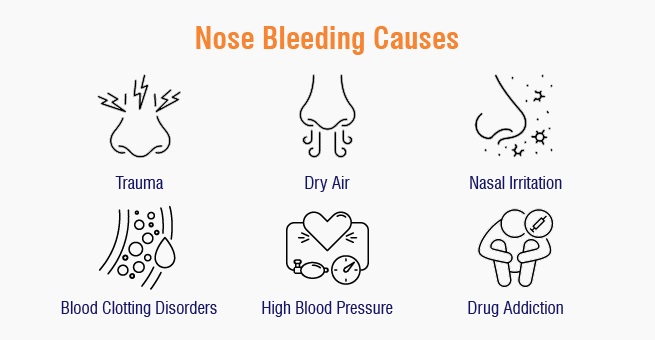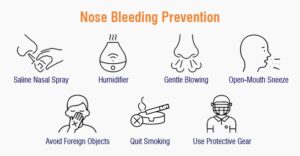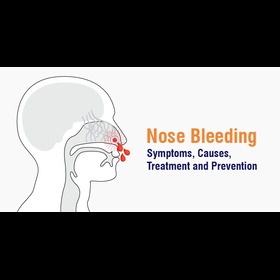
Nosebleed, also called epistaxis, is a common concern among parents. While nosebleeds can be alarming, especially when blood appears suddenly, they are usually not a sign of something serious. In most cases, nosebleeds in children are harmless and can be managed at home. However, understanding why they happen and how to respond is essential for a parent to take the right course of action.
In children, bleeding is more common from the front part of the nose near the nostrils, where there are more blood vessels. Bleeding from the back part of the nose near the throat is rare in children, but when it occurs, it is serious and causes significant blood loss.
Why Do Nosebleeds Occur?
The inside of the nose contains many tiny, fragile blood vessels close to the surface. In children, these vessels are more delicate, making them prone to bleeding from minor irritations or injuries. Common causes include:
Dryness: One of the most common causes of nosebleeds in children is dry environmental air. Similar to our skin surface, which can dry out due to weather, even the thin skin inside the nose gets irritated and dried. This makes it more prone to bleeding.
Nose picking: Many children have a habit of picking their noses. At times, they may also scratch it due to some underlying irritation. This again injures the thin lining inside the nose, thereby exposing the thin and small blood vessels, leading to a nosebleed.
Cold or sinus infection: This can be another cause of irritation in the nose, thereby leading to bleeding from it.
Allergies: Many a time, minor allergies may require anti-allergy medication. Such medicines can be responsible for dryness of the nose, which thus results in nosebleeds. Any bleeding after medication should be reported to the doctor.
Trauma: Injury to the face or directly to the nose can result in bleeding. If the injury is severe, it should be attended to by a doctor immediately, in order to identify if any early intervention is needed.
Infections: Both bacterial and viral infections can result in nosebleeds. Bacterial infections may result in red, crusted areas inside the nose, which cause bleeding.
Abnormal growth in the nose: If nose bleeding is accompanied by any visible growth inside the nose, reported difficulty in breathing, or noisy breathing noticed by the parent, a thorough evaluation by a specialist is essential to rule out deeper underlying problems.
Underlying blood-related disorders: At times, a nose bleed may be a more frequent occurrence and can present with other problems, such as red spots on the skin, bleeding from gums, etc. Such a nosebleed can be an indication of a more serious blood-related problem and requires a detailed examination by a specialist.
Foreign Objects – Sometimes children insert small objects into their noses, which can damage blood vessels.
Parents should be careful of children inserting foreign objects inside their noses, as it can be a medical emergency.
What to do for a Nosebleed in Children?
When your child’s nose starts bleeding, stay calm. Your reaction will help your child feel safe. The following steps should be followed-
Make them Sit Upright and Lean Forward.
Make the child sit upright (not lie down) and then make them lean slightly forward. This prevents blood from running down the throat, which can otherwise cause coughing or vomiting.
Pinch the Soft Part of the Nose
Use your thumb and index finger to pinch the soft part of the nostrils (just below the bony bridge). Do not check repeatedly, and maintain steady pressure for 10 minutes.
Encourage Gentle Breathing Through the Mouth
Ask your child to stay calm and breathe slowly through the mouth while you apply steady pressure on their nose.
Apply a Cool Compress
Along with the above, placing a cold pack or cloth with ice cubes on the bridge of the nose can help constrict blood vessels.
What to avoid after bleeding stops?
-Instruct the child not to blow or pick the nose for at least 24 hours.
-Avoid bending forward or any heavy activity that can trigger another bleed.
When to Seek Medical Help?
Contact your doctor or visit the emergency department if:
- The bleeding doesn’t stop after 20 minutes of continuous pressure.
- The nosebleed follows a serious injury (e.g., a fall or hit to the face).
- Your child feels dizzy, weak, or faints.
- There is frequent bleeding (more than 2–3 times a week).
- You notice large amounts of blood or blood coming from both nostrils.
- Your child has bleeding from other areas, such as from gums, skin, bruises, or a family history of bleeding disorders.
What can parents do to prevent nosebleeds in Children?

Some tips to prevent nosebleeds in children-
Keep the Nose Moist: Use saline nasal sprays or apply a thin layer of petroleum jelly to the inside of the nostrils during dry seasons.
Humidify the Air: A cool-mist humidifier in your child’s room can prevent dryness.
Discourage Nose Picking: Trim nails short and remind children to use a tissue if their nose feels itchy or blocked.
Manage Allergies: Treat nasal allergies promptly to reduce inflammation and irritation.
Most nosebleeds in children are harmless and short-lived. With the right first-aid steps and preventive care, you can manage them at home. Still, keep an eye on frequency and severity if they become recurrent or severe; a doctor’s evaluation is essential to rule out underlying causes.
Why choose Ankura?
Ankura Hospital for Women and Children has the best team of expert pediatricians who are committed to providing empathetic and quality care for babies and children. We offer the most advanced and world-class setup for children’s care, where every child is treated with personalized care, clinical excellence, and compassion. Our multidisciplinary team comprises all pediatric super-specialists under a single roof for holistic childcare.
At Ankura, we believe in a family-centered approach, ensuring parents are involved in every step of the care process. With state-of-the-art diagnostic tools, child-friendly facilities, and 24/7 pediatric support, Ankura remains a trusted destination for children’s health.
FAQ’s for Nosebleed in Children: Causes, Symptoms, Treatment Tips and When to See a Doctor
Most nosebleeds are not dangerous and stop on their own. However, frequent or heavy bleeding should be checked by a doctor.
No. Tilting the head back can cause blood to flow down the throat, leading to coughing or vomiting. Always have your child sit upright and make them lean slightly forward.
Follow the same first-aid steps, make them sit up, lean forward, and pinch the nose. If bleeding doesn’t stop after 20 minutes or starts again after stopping, then consult a doctor.
Nosebleeds due to dryness and injury can be prevented. Keep the nose moist with saline spray or petroleum jelly, use a humidifier, and discourage nose picking to prevent nosebleeds due to these causes.
Ankura Hospital for Women and Children, which is spread across multiple locations in Hyderabad, has the presence of the best pediatricians and pediatric super specialists under a single roof. Ankura is also located in Khammam, Vijayawada, Tirupati, Pune, and Bhubaneswar.




